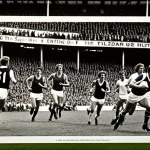Direct impact of UK sports events on tourism
UK sports tourism generates significant economic impact, largely driven by globally renowned sports events such as the Premier League, Wimbledon, and the Six Nations. These events attract millions of visitors each year, combining both international visitors and domestic visitors. For example, the Premier League, with its worldwide fanbase, draws international travelers eager to attend matches or experience the stadium atmosphere firsthand. Wimbledon, beyond being a major tennis tournament, sees a surge in summer tourism as visitors combine the event with sightseeing.
Visitor statistics reveal that a large portion of attendees travel specifically for these events, reflecting their status as major tourist attractions. Spending by sports tourists encompasses accommodation, dining, transportation, and entertainment, directly benefitting local economies. Studies consistently show that sports tourists tend to spend more than typical leisure tourists, emphasizing the economic value brought by these events.
Have you seen this : Exploring the Rich History of UK’s Sports Legends: How Did They Shape the Nation?
This influx not only supports local businesses but also stimulates broader regional growth. The combined effect of sports events as magnet attractions within the UK significantly boosts tourism revenues and helps maintain the country’s competitive edge as a global sports tourism destination.
Influence of sports teams and facilities on travel behaviour
Popular iconic UK teams such as Manchester United, Liverpool, and Tottenham Hotspur significantly influence both domestic visitors and international visitors in their travel plans. Fans often prioritize visiting stadiums like Old Trafford, Anfield, and Wembley, making stadium tours a major draw for UK sports tourism. These tours offer unique behind-the-scenes experiences, combining passion for the game with cultural exploration.
Have you seen this : What are the Key Strategies for Successful Youth Development in UK Sports?
The UK’s rich sports heritage deeply shapes tourists’ itineraries. Many travelers, beyond attending matches, include museum visits linked to clubs’ histories and trophies, reflecting a keen interest in the narratives that build team identities over decades. For instance, visitors to Anfield can explore The Liverpool FC Story, which highlights legendary players and historic moments.
This enthusiasm drives increased footfall to host cities and fuels expenditure in sectors such as accommodation, food services, and local attractions. The appeal of stadium tourism amplifies the overall economic impact of sports, as visitors integrate these experiences into broader UK travel plans. Consequently, the presence of iconic football clubs and accessible sports heritage sites remains crucial to sustaining year-round tourism and enriching the UK’s sports tourism landscape.
Economic benefits to local businesses and communities
UK sports tourism drives substantial economic benefits to local businesses and communities, especially during major sports events. Visitor spending spikes notably in the hospitality sector, with increased demand for accommodation, dining, and transport. For instance, local hotels and restaurants near stadiums see surges in bookings and patronage around Premier League matches or Wimbledon, directly supporting business revenues.
These demands ripple beyond the core sports venues, benefiting retail, taxis, and leisure services as tourists extend their stays. As a result, job creation occurs not only seasonally but often sustains local employment in service industries. Community regeneration also emerges when investments in sports infrastructure enhance public spaces, transport links, and urban amenities, encouraging repeat visits and broader tourism.
Long-term, this creates a virtuous cycle where improved facilities attract more international and domestic visitors—fostering regional tourism growth. The localisation of event-driven spending stimulates economies beyond immediate ticket sales, emphasizing the wider economic impact of sports tourism. Consequently, UK towns and cities hosting iconic events see tangible returns, reinforcing how local business impact and community wellbeing are tightly linked to successful sports tourism promotion.





